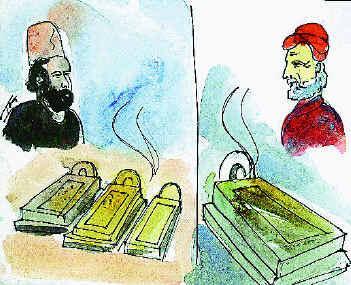DELHI :
Zauq and Ghalib took digs at each other through a sehra penned for a prince’s wedding and the Red Fort reverberated with this clash of titans.
The sehra, or prothalamion, (song to celebrate a wedding) is now a vanishing genre. I remember while I was growing up that almost all nikahs would have a sehra read by a relative with poetic aspirations, after the ceremony.
Though sehras are supposed to be in praise of the groom and a prayer for his wedded life, these would be witty and laudatory at the same time, usually a humorous dig at all relatives. A copy of this would then be distributed to the wedding guests.
Sehras fall into the category of nazms and have to be in meter.
The most famous sehra, of course, is the one penned by Mirza Ghalib (1797-1869) for a royal wedding, in which he took a dig at the emperor’s Ustad, Sheikh Ibrahim Zauq (1788/9-1854).
Zauq and Ghalib were contemporaries in Delhi, and their rivalry was legendary. Zauq had been given the title of Khaqani e Hind and drew a nominal salary of Rs 4 per month. The respect and position that he gained as a result was immense. It also gave him free access to the Qila e Moalla (Red Fort).
This was a constant thorn in the side of Mirza Ghalib, who felt he was better and deserved a royal position too. Thus, he never let go of any chance to score poetic points over his rival.
One such chance came at the last grand Mughal wedding, on April 2, 1852 – that of Jawan Bakht, Badshah Bahadur Shah Zafar’s son by his favourite and youngest wife Zeenat Mahal, to Nawab Shah Zamani Begum.
Begum Zeenat Mahal asked Ghalib to write a ‘sehra’ for her son’s wedding. The honour should have gone to Sheikh Ibrahim Zauq, but he was reportedly unwell.
William Dalrymple in his book The Last Mughal writes: “The marriage procession of Prince Jawan Bakht left the Lahore Gate of the Red Fort at 2 am on the hot summer night of 2 April, 1852.”
Dalrymple goes on to write that what was remembered longest and discussed most about the wedding was not so much the festivities or the feasting or the fireworks, but “the marriage odes recited by the Poet Laureate Zauq, and his rival Mirza Nausha, now more widely known by his pen-name Ghalib.”
Ghalib wrote a ‘sehra’ whose maqta (the last couplet in an Urdu ghazal which contains the poet’s pen name) was:
- ‘hum suKhan_fahm haiN, Ghalib ke tarafdaar nahiN
- dekheN keh de koi is sehre se baRh kar sehra’
We are connoisseurs of poetry, not partial to Ghalib
Let’s see if there’s anyone who can write a better ‘sehra’
The emperor, realising that this was a dig at his mentor Zauq, is said to have been displeased with the maqta. A slight to his mentor was seen as a slight to the emperor himself. Zafar asked Zauq to write a ‘sehra’ too. Not one to let go of an opportunity, Zauq included these line.
- jin ko daawa ho suKhan ka yeh sunaa do unko
- dekh is taraH se kehte haiN suKhanwar sehra
Tell those who claim to be eloquent
This is how poets write a sehra
The fort reverberated with this clash of titans and it is recorded that the Crown Prince Mirza Fakhruddin (also a disciple of Mirza Zauq) exclaimed, “Ustaad ne maidan maar liya“.Dalrymple writes: “The squabble at the wedding was over a single verse in Ghalib’s sehra (or wedding oration) where he appeared – characteristically – to suggest that no one in the gathering could write a couplet as well as he…. Zafar [the king] also encouraged Zauq to reply to Ghalib’s unprovoked sally. The fine sehra that the Poet Laureate came up with ended with a couplet tossing the challenge back to Ghalib:
The person who claims poetic skills,Recite this to him and say,”Look-this is how a poet”
This round went to Zauq as the singers in attendance picked up the verse and spread it all over Shahjahanabad. By next day it was in the newspapers.”
Ghalib then wrote his celebrated qat’a-e-ma’azerat’ (letter of apology), in response to the emperor’s reaction. However, the egoistic poet left no ‘verse’ unturned in adding insult to injury, using poetry as a medium to prove his supremacy and take a dig at Zauq’s humble origins and the Emperor’s negligence of him.
The maqta of this ghazal became even more famous.
- manzoor hai guzaarish-e-ahvaal-e-waaqa’aii
- apna bayaan-e-Husn-e-tabii’yat nahiN mujhe
- I accept the request to state the facts, To praise oneself is not a habit of mine
- sau pusht se, hai pesha-e-aaba sipahgarikuchh shayari,
- zari’ye-e-izzat nahiN mujhe
- My forefathers have been warriors for hundred generations
- By writing poetry, fame I seek not
- aazaadah rau huN, aur mira maslak hai sul
- H-e-kulhargiz kabhi kisi se adaawat nahiN mujhe
- I am a free spirit and my conduct is always peaceful,I bear malice against no one
- kya kam hai yeh sharaf ke Zafar ka Ghulaam huN
- maana ke jaah-o-mansab-o-sarwat nahiN mujhe
- Is the privilege not enough that I serve Zafar,
- Agreed rank, position and affluence I have not
- ustaad-e-shah se ho mujhe par Khaash ka Khayaal
- yeh taab, yeh majaal, yeh taaqat nahiN mujhe
- The thought of a row with the king’s mentor
- This arrogance, this audacity, this strength I have not
- jaam-e-jahaaN_numa hai shahenshaah ka zameer
- saugand aur gawaah ki Haajat nahiN mujhe
- The king’s conscience is all encompassing,
- The need for an oath and witness I have not
- sehraa likhaa gaya ze_rah-e-imtiSaal-e-amr
- dekhaa ke chaarah Ghair ita’at nahiN mujhe
- The sehra was written in obedience of orders,
- Non compliance with that order I dare not
- maqt’e meiN aa paRi hai suKhan gustaraana baat
- maqsood is se qat’a-e-moHabbat nahiN mujhe
- I wrote something in the maqta’ which became popular,
- A reason to ending friendship I want not.
- ruu-e-suKhan kisi taraf ho, tau ruu_siyaah
- sauda nahiN, junooN nahiN, veHshat nahiN mujhe
- If I aimed it at someone in particular then may my face beblackened,
- I am neither mad, nor crazed nor so deprived of sense.
- qismat buri sahii, pa tabii’yat buri nahi
- Nhai shukr ki jagah, ke shikaayat nahiN mujhe
- Although my luck is bad, but my habits aren’t bad,
- I’m in a place of thankfulness and complain I do not.
- saadiq huN apne qaul meiN Ghalib Khuda_gawaah
- kehta huN sach ke jhooT ki a’adat nahiN mujhe
- Always true to his word is Ghalib, as God is my witness,
- I tell you the truth as lie I do not.
This is the original sehra written by Ghalib for Mirza Jawan Bakht:
- Khush ho ai baKht ke hai aaj tere sar sehraabaa
- Ndh shahazada Javaa.N baKht ke sar par seharaa
- [baKht = luck; pun on Groom’s name]
- kyaa hii is chaaNd se mukhaDe pe bhalaa lagataa hai
- hai tere husn-e-dil_afroz kaa zevar sehraa
- [husn-e-dil_afroz = beauty that lights up the heart]
- sar pe chaDhnaa tujhe phabataa hai par ai tarf-e-kulaah
- mujhko Dar hai ke na chhiine tera lambar sehraa
- [phabataa = suits]
- nav bhar kar hii piroye gaye honge motii
- varnaa kyun laaye hain kishtii mein lagaakar sehraa
- saat dariyaa ke faraaham kiye honge motii
- tab banaa hogaa is andaaz kaa gaz bhar sehraa
- ruKh pe dulhaa ke jo garmii se pasiinaa Tapakaa
- hai rag-e-abr-e-guharabaar saraasar sehraa
- ye bhii ik be’adabii thii ke qabaa se baDh jaaye
- rah gayaa aan ke daaman ke baraabar sehraa
- jii me.n itaraaye.N na motii ke hamii.n hai.n ik chiiz
- chaahiye phuulon ko bhii ek mukarrar sehraa
- jab ke apane mein samaave’n na Khushii mein maare
- guu.Ndhe phuulon kaa bhalaa phir koii kyuu.Nkar sehraa
- ruKh-e-raushan kii damak gauhar-e-Galtaa kii chamak
- kyuN na dikhalaaye faroG-e-maah-o-aKhtar sehraa
- taar resham kaa nahii.n hai ye rag-e-abr-e-bahaar
- laayegaa taab-e-giraa.Nbaari-e-gauhar sehraa
- ham suKhan_faham hain “Ghalib” ke tarafadaar nahii.n
- dekhe.n is sehare se kah de koii ba.Dhakar sehraa
- [suKhan_faham = patron of poetry]
- Zauq’s sehra
- Ai Javaan Bakht mubarak tujhe sar par sehra
- Aaj hai Yaman wa Sada’t ka tere sar sehra
- Aaj woh din hai ke laaye durr e anjum se falak
- Kashti e zar mah e nau ke lagakar sehra
- Tabish husn se manind shua e khursheed
- Rukh e pur noor pe hai tere munawwar sehra
- Woh kahe Salle Alay eh kahe SubhanAllah
- Dekhe mukhade pe jot ere mah o akhtar sehra
- Taa banni aur banne mein rahe ikhlas baham
- Goondhiye sura e ikhlas padhkar sehra
- Dhoom hai gulshan e afaaq mein is sehre ki
- Gaaye’n marghaan e nava sanj na kyunkar sehra
- Ru e farkh pe jo hain tere baraste anwar
- Taar e barish se bana ek sarasar sehra
- Ek ko ek pe tazai’n hai dam e araaish
- Sir pe dastar hai, dastar ke oopar sehra
- Ek gauhar bhi nahin sadgaan e gauhar mein choda
- Tera banwaaya hai le leke jo gauhar sehra
- Phirti khushboo se hai itraayi huyi baad e bahaar
- Allah Allah re phoolo’n se moatta’r sehraa
- Sar pe turra hai muzaiyyan to gale mein baddhi
- Kangana haath mein zeba hai to munh par sehra
- Runumayi mein tujhe de mah o khurshid o falak
- Khol de munh ko jot u munh se uthakar sehra
- Kasrat e taar e nazar se hai tamaashiyo’n ke
- Dam e nazara tere ru e niko par sehra
- Durr e khush aab e mazameen se banakar laaya
- Waaste tere tera Zauq sanagar sehra
- Jis ko daawa hai suKhan ka yeh sunaa de usko
- Dekh is taraH se kehte haiN suKhanwar sehra
(This article first appeared on the author’s blog.)
source: http://www.dailyo.in / Daily O / Home> Arts & Culture / by Rana Safvi @iamrana / December 27th, 2017










